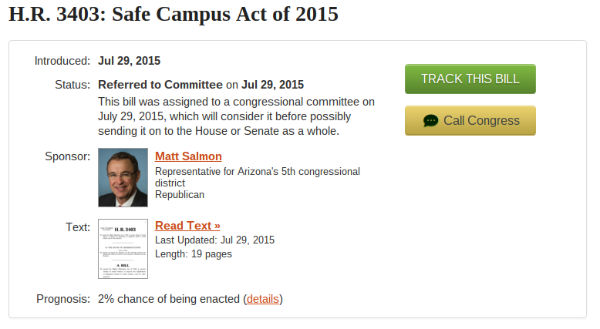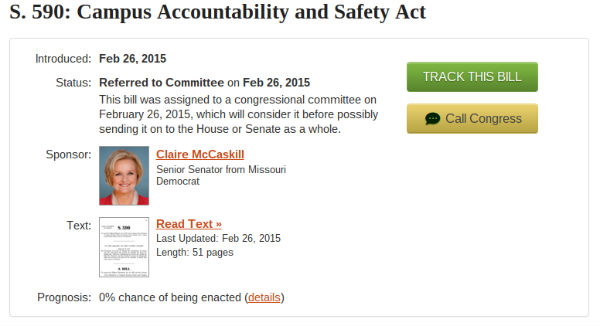
You wouldn’t know it by the number of cosponsors, but bills in Congress that would better protect the due-process rights of students accused of rape have a better chance of becoming law than competing bills that favor campus rape accusers.
That’s according to GovTrack.us, which not only keeps tabs on the status of legislation but also gives bills “prognosis scores” – the likelihood of their enactment “based on factors that are correlated with successful or failed bills in the past, such as whether the sponsor is a committee chair.”
The due process advocacy group Stop Abusive and Violent Environments compiled a scorecard this week of the six bills pending in Congress that includes their GovTrack.us prognosis scores.
The Safe Campus Act, which would require rape accusers to report allegations to police if they want colleges to also investigate, has the best odds of any bill on the subject, despite losing three of its five backers in November following brutal attacks by groups backing accusers.
Those odds? Nine percent of passing the House Education Committee, and 2 percent of enactment into law. Aiding its chances: Its sponsors are committee members and Republicans (the House majority), and 5 percent of the committee’s bills passed the committee or better (enactment).
Sound like a lost cause? Those are only slightly worse odds than the chance of the average bill passing committee and becoming law: 15 percent and 3 percent, according to GovTrack.us.
The Fair Campus Act, another Republican-led bill whose main difference from the Safe Campus Act is that it does not require reporting to police, has a 6 percent chance of committee passage and 1 percent chance of enactment, and that’s only because it was referred to the Education Committee.
The four bills that are friendly to accusers – including the Democratic favorite HALT Campus Sexual Violence Act (74 Democratic cosponsors) and the only bicameral bill, the Campus Accountability and Safety Act (41 Dems, 33 GOP) – have a zero percent chance of becoming law.
The HALT bill has the best shot of committee passage at 2 percent, while the CASA bills also have zero chance of passing committee, despite having relatively broad bipartisan support among cosponsors. (Several more factors went into the accuser-friendly bills’ prognosis scores than the due process-friendly bills.)
Like The College Fix on Facebook / Follow us on Twitter
IMAGE: Shutterstock








Please join the conversation about our stories on Facebook, Twitter, Instagram, Reddit, MeWe, Rumble, Gab, Minds and Gettr.